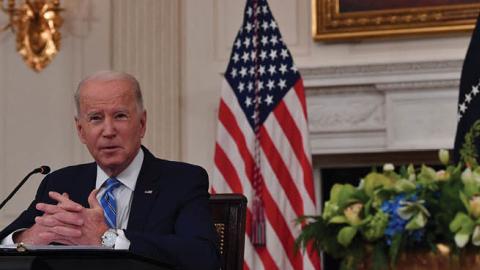The French foreign minister recently warned that the Vienna talks on Iran’s nuclear program are stalled, while Iran is advancing toward a bomb. It’s time to ask: Has President Biden’s policy made a conflagration in the Middle East more or less likely? And if one comes, has the administration positioned the United States properly for it?
President Biden has made a counterintuitive gamble that Iran will relinquish its cherished nuclear ambitions if America first relieves the “maximum pressure” that President Trump imposed. The new U.S. approach has not softened the Iranians. It has made an impression in Israel, but the result is not what the Biden team wanted.
In recent weeks, top civilian and military Israelis with diverse political views have declared that Israel should act militarily unless the Vienna talks verifiably end Iran’s progress toward a bomb. Most Israelis concur, and this consensus appears newly and impressively wide.
Washington has largely ignored the cautionary drumbeat, perhaps because Israel has threatened action before. But circumstances have changed. In the past, Iran was years from nuclear-weapons capability, and American officials credibly promised to prevent Iran from getting there, which kept Israel more evenly divided on the necessity of military action. Now, given technical advancements made since the 2015 nuclear deal, Iran may be only a few months from its goal. Mr. Biden said in June that Iran would “never get a nuclear weapon on my watch” (emphasis added). That hedge is cold comfort to the Israelis, who rightly worry that Iran, even under the restrictions of a revived 2015 deal, could soon (in three years) have nuclear-breakout capability — and, if they chose to violate those restrictions, might develop a bomb even sooner than that before they could be detected.
Israeli leaders are daily declaring they have no interest in diplomacy that only pretends to eliminate or delay the danger. As they see it, a nuclear Iran poses two life-or-death threats. One is from Iran, whose leaders routinely denounce Israel as a cancer they wish to destroy. The second is from wider nuclear proliferation, for many expect that if Iran gets nuclear weapons, Saudi Arabia, Turkey, Egypt, and others will seek to arm themselves likewise.
Herein lies not just an Israeli, but a regional and worldwide nightmare: a volatile region that, absent the decision time provided by missiles that travel intercontinental distances, would be marked by dispersed nuclear weapons subject to destabilizing launch-on-warning policies. These weapons would be in the hands of technically challenged militaries that include numerous criminal and terrorist elements. Under such conditions, there would be risks of regional conflict escalating into nuclear war and of “loose nukes” falling into the hands of terrorists.
The Israelis have an interest in a peaceful solution, because the alternative — striking Iran’s nuclear facilities with military force — would likely trigger harsh retaliation. At a minimum, Israel expects that such strikes would prompt nearby Iranian terrorist proxies Hezbollah and Hamas to launch attacks, which could include barrages of tens of thousands of Iranian-provided projectiles, many precision-guided. Such barrages would cause heavy Israeli casualties, and also the deaths of American and other foreign visitors. Wider, prolonged war might ensue, spawning waves of refugees and disrupting oil supplies. Top Israelis have concluded they can endure these dreadful costs, but not the dangers of a nuclear Iran.
For decades, a key factor restraining Israeli action and holding nuclear proliferation in check was confidence that America would keep rogue states from acquiring nuclear weapons and protect its allies from invasion or crippling attacks. Recent events have shaken that confidence.
Consider the recent record. The Obama administration assured Israel that it had the Iranian problem in hand; then it produced the 2015 deal Israelis decried as weak. After Obama’s 2011 Iraq withdrawal (in which Biden played a leading role) and Biden’s panicked 2021 flight from Afghanistan, it is hard for any regional leader to count confidently on Washington to stand up to a nuclear Iran. The current Ukraine crisis reinforces these doubts. In the 1990s, Ukraine gave up its nuclear weapons, relying in part on promises of U.S. protection. But that protection was absent in 2014, when Russia seized Crimea, and today, as Putin’s divisions threaten invasion, Biden foreswears military resistance.
Between the end of the Obama administration and the beginning of the Biden administration, Israeli cyber and covert actions slowed down the Iranian program, and President Trump’s rejection of the 2015 deal and his “maximum pressure” campaign gave Israel some hope that U.S. resolve and, when necessary, action might solve the problem. But today, as Iranian scientists press forward, time is running out on diplomacy and perhaps also on Israel’s inventive covert operations. Once the Iranians accumulate enough fissionable material, it can be dispersed and weaponized, diminishing the chances of finding and destroying enough of it to make a difference.
These changes have united a broad spectrum of Israeli leaders around the necessity of destroying Iran’s nuclear infrastructure by military means. The Biden administration would be foolish to underestimate Israel’s resolve on this point. Recall that Israel, despite American opposition, bombed Iraq’s nuclear reactor in 1981 and Syria’s in 2007.
What, then, should President Biden do?
First, his administration needs a tougher Iran policy. Convinced that U.S. officials are preoccupied with domestic priorities and the looming Ukraine and Taiwan crises, Tehran openly scoffs at longstanding U.S. threats to use military force. So long as that is the case, there will be no realistic prospect of success in Vienna. Second, the administration could increase U.S. leverage by recognizing the changed Israeli political realities and openly bolstering Israel’s capabilities, including its means of handling Iranian retaliation.
Given the dwindling time to restrain Iran, and the other pressing foreign-policy problems on Biden’s plate, we should welcome help from Israel, our most capable regional ally. The credible military resolve of a united allied front offers the best hope for effective diplomacy.
Read in National Review


















